
"Crazy Little Thing Called Love" is a song by the British rock band Queen. Written by Freddie Mercury in 1979, the track is included on their 1980 album The Game, and also appears on the band's compilation album Greatest Hits in 1981. The song peaked at number two in the UK Singles Chart in 1979, becoming the group's first number-one single on the Billboard Hot 100 in the US in 1980, remaining there for four consecutive weeks. It topped the Australian ARIA Charts for seven weeks. It was the band's final single release of the 1970s.
Mark Morrison is a British singer. His single, "Return of the Mack", became a No. 1 or Top 10 hit in several European countries in 1996. The song peaked at No. 2 in the United States the following year.

"It's Raining Men" is a song by the American musical duo the Weather Girls from their third studio album, Success (1983). It was released as the album's lead single on September 10, 1982, through Columbia Records and CBS Records International. Paul Jabara wrote the song in collaboration with Paul Shaffer, and produced the song in collaboration with Bob Esty. "It's Raining Men" is a Hi-NRG and post-disco song that incorporates elements of R&B, soul, and 1970s-style electronic dance music. Its lyrics describe an excitement and enjoyment of many different types of men.
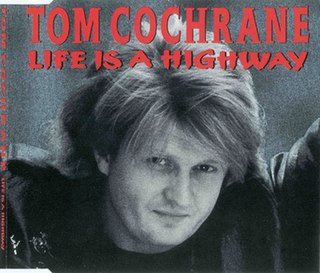
"Life Is a Highway" is a song by Canadian musician Tom Cochrane from his second studio album, Mad Mad World (1991). The song became a number-one hit in Canada in late 1991. "Life Is a Highway" also peaked at number six on the US Billboard Hot 100 chart in August 1992 and reached the top three in Australia and New Zealand the same year. The song was covered by Chris LeDoux for his 1998 album One Road Man and Rascal Flatts for the Cars soundtrack.

Martha Elaine Wash is an American singer-songwriter, actress, and producer. Known for her distinctive and powerful voice, Wash first achieved fame as half of the Two Tons O' Fun, who sang backing vocals for the disco singer Sylvester including on his signature hit "You Make Me Feel ". After gaining their own record deal, they released three consecutive commercially successful songs which all peaked at number two in the dance charts. The duo was renamed the Weather Girls in 1982 after they released the top-selling single "It's Raining Men", which brought them to mainstream pop attention. The Weather Girls released five albums and were heavily featured on Sylvester's albums.

Angie Brown is a British singer and songwriter from Brixton, South London.

"Return of the Mack" is a song written and recorded by British R&B singer Mark Morrison, released as the third single from his debut album by the same name (1996). It topped the UK Singles Chart a month after its release, then became a European and Australian hit. In the United States, it reached number two on the Billboard Hot 100 and went platinum. The accompanying music video, directed by Jake Nava, was released in the United Kingdom in March 1996 and in the United States in February 1997.
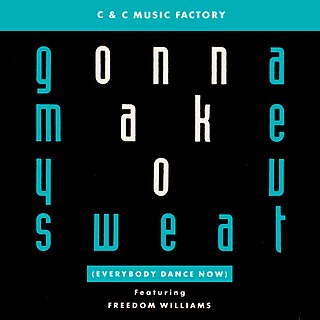
"Gonna Make You Sweat (Everybody Dance Now)" is a song by American dance music group C+C Music Factory, released in late 1990 as the debut and lead single from their first album, Gonna Make You Sweat (1990). The song is sung by singer Martha Wash and rapper Freedom Williams. It charted internationally and achieved great success in the United States, Austria, Germany, and Sweden, where it reached number one on the charts.

Just the Two of Us is the second collaborative studio album by Porter Wagoner and Dolly Parton. It was released on September 9, 1968, by RCA Victor. The album was produced by Bob Ferguson. It peaked at number five on the Billboard Top Country Albums chart and number 184 on the Billboard 200 chart. The album spawned three singles. "Holding on to Nothin'" and "We'll Get Ahead Someday" were top ten hits on the Billboard Hot Country Songs chart, peaking at numbers seven and five, respectively. The third single, "Jeannie's Afraid of the Dark", peaked at number 51.

My Blue Ridge Mountain Boy is the fourth solo studio album by American singer-songwriter Dolly Parton. It was released on September 8, 1969, by RCA Victor. The album was produced by Bob Ferguson. It peaked at number six on the Billboard Top Country Albums chart, Parton's first solo top ten, and number 194 on the Billboard 200 chart. The album spawned three singles: "Daddy", "In the Ghetto", and the title track. "Daddy" was the most successful, peaking at number 40 on the Billboard Hot Country Songs chart.

In the Good Old Days (When Times Were Bad) is the third solo studio album by American singer-songwriter Dolly Parton. It was released on February 3, 1969, by RCA Victor. The album was produced by Bob Ferguson. It peaked at number 15 on the Billboard Top Country Albums chart. The album's title track was the only single released and it peaked at number 25 on the Billboard Hot Country Songs chart.
"Love Can Build a Bridge" is a song written by Naomi Judd, Paul Overstreet, and John Barlow Jarvis, and recorded by American country music duo the Judds. It was released in 1990 as the second single and title track from their album of the same name. It was a top-five country hit in mid-1991. The song has inspired several cover versions, including one by Cher, Chrissie Hynde, Neneh Cherry, and Eric Clapton that topped the UK Singles Chart in 1995.

"You Light Up My Life" is a ballad written by Joseph Brooks, and originally recorded by Kasey Cisyk for the soundtrack album to the 1977 film of the same title. The song was lip synced in the film by its lead actress, Didi Conn. The best-known cover version of the song is a cover by Debby Boone, the daughter of singer Pat Boone. It held the No. 1 position on the Billboard Hot 100 chart for ten consecutive weeks in 1977 and topped Record World magazine's Top 100 Singles Chart for a record 13 weeks.
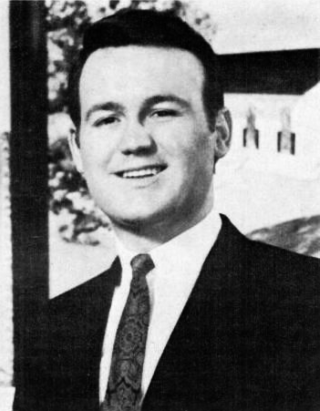
Warner McPherson, known professionally as Warner Mack, was an American country music singer-songwriter. Mack had 23 hits on the country charts from the late 1950s to the early 1980s.
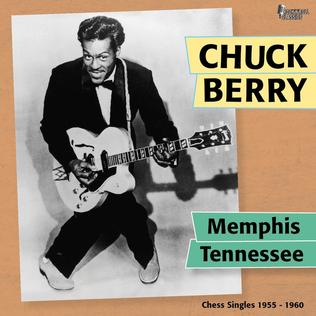
"Memphis, Tennessee", sometimes shortened to "Memphis", is a song by Chuck Berry, first released in 1959. In the UK, the song charted at number 6 in 1963; at the same time Decca Records issued a cover version in the UK by Dave Berry and the Cruisers, which also became a UK Top 20 hit single. Johnny Rivers's version of the song was a number two US hit in 1964.
"Long Gone Lonesome Blues" is a 1950 song by Hank Williams. It was Williams' second number-one single on the Country & Western chart. "Long Gone Lonesome Blues" stayed on the charts for 21 weeks, with five weeks at the top.
"Is It Wrong (For Loving You)" is a song written by Warner Mack. Mack recorded the song in 1957, and reached No. 9 on the Billboard country charts and spent 36 weeks on the chart.
"Born to Be Blue" is a song written by Mike Reid, Brent Maher and Mack David, and recorded by American country music duo The Judds. It was released in August 1990 as the first single from the album Love Can Build a Bridge. The song reached number 5 on the Billboard Hot Country Singles & Tracks chart.
"I Washed My Hands in Muddy Water" is a song written by Joe Babcock.
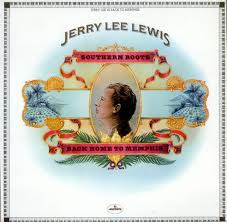
Southern Roots: Back Home in Memphis is an album by Jerry Lee Lewis released on Mercury Records in 1973.













